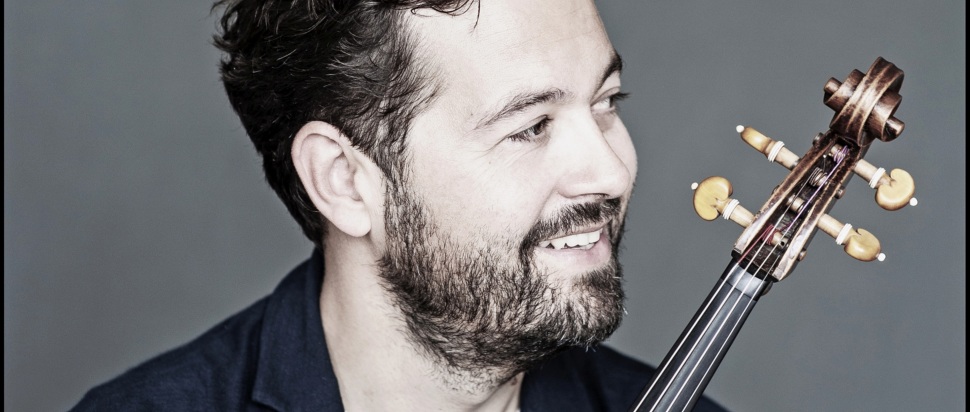Lawrence Power on the viola and performing with the SCO
Ahead of his appearance at the Scottish Chamber Orchestra's Borealis shows, part of their New Dimensions series, we chat with world-class violist Lawrence Power
We catch Lawrence Power at 8pm on a warm Tuesday night – the temperature has bloomed over the weekend and the Northern Lights have been spotted across the UK. Caught between childcare and rehearsals for his residency at the Southbank Centre, Power is unlikely to see this for himself.
Power is a world-class viola player, highly sought-after by audiences and composers, and therefore quite hard to pin down. For context, in 2003, aged just 26, he was headhunted to become principal violist for the Berlin Philharmonic Orchestra, and turned the job down.
His status as a celebrated violist, though undoubtedly deserved, would for hundreds of years have been an oxymoron, given that the instrument was used mostly to fill out orchestral harmonies and serve as the butt of other musicians’ jokes. In Power’s own words, the viola is a “compromised voice that shouldn't really exist.” But over the last century, as attitudes have changed and more composers have started to write for the instrument, its top players have started to gain star status.
Power comes to Scotland at the end of October for Borealis, two shows with the Scottish Chamber Orchestra in Edinburgh (The Queen's Hall, 31 Oct) and Glasgow (City Halls, 1 Nov). The latter performance is included in five-day festival Nordic Music Days Glasgow (30 Oct-3 Nov). Part of their New Dimensions series, Borealis is a programme of new sounds from Scotland and the Nordic nations. Power's contribution is a performance of the viola concerto written for him in 2021 by Swedish composer Anders Hillborg. The piece is heavily textured and effect-forward, and both explosive and contemplative – it begins and ends in a fit of anger, but in between times conjures great northern landscapes for your mind to explore.
The concerto also invokes the North in a different sense. It was originally commissioned and premiered by the Liverpool Philharmonic Orchestra and Hillborg wanted a part of the city in the piece’s DNA – if you listen closely you’ll hear that the middle section quotes The Beatles’ I Am the Walrus.
In British classical music the viola has often been used as an expressive, elegiac instrument – Hillborg’s concerto is decidedly not that. The piece is an abrasive, emotional statement, but Power says that’s why people connect with it. “Once people hear this piece, I think they'll find it incredibly accessible and direct – more than Bach and Brahms.”
For him, the audience’s connection to the music is as important as his playing, or the composer’s writing. He doesn’t have a process to speak of when it comes to interpreting a score, but he thinks a lot about how he relates to the people watching him. “As a performer you're just one third of a triangle, you know? You need an audience and you need the music. And I think without one of those three elements, there is no musical experience... I think it's very important that we never sort of get above ourselves, that we're all in it together.”
The audience’s role in live music is as integral now as it’s ever been. No matter the style or genre, the energy a crowd gives out feeds back into the performance – there’s a reason performers and audiences alike love going to gigs, particularly in Glasgow. Power points to the number of now infamous premieres at which the audience hated what went on to be a celebrated work, or loved it so much that the orchestra played one movement over and over and over again. At the 1913 premiere of Stravinsky’s Rite of Spring, there were famously audience members who hated it so much that they started throwing punches mid-performance.
But for that time-honoured tradition of rioting in the concert hall to continue, the classical music world has to find a way to attract new audiences – a discussion Power says they’ve been having since he was a student. He suggests some younger audiences find the idea of a concert hall, or the very label of ‘classical music’ off-putting. His treatise for the evolution, possibly even survival of the genre, is that we stop demarcating it so strictly, and focus on putting on a good show. “'Classical' is quite an elitist word, isn't it? It kind of elevates it above other music – 'classical'.
“I don't think we should call it classical music if we're trying to reach out – it’s just a show, isn't it?”
New Dimensions: Borealis, The Queen's Hall, Edinburgh, 31 Oct; City Halls, Glasgow, 1 Nov. Tickets for Students and Under 26s are £6
Further performances in the New Dimensions series will take place in 2025: Ad Absurdum, The Queen's Hall, Edinburgh, 30 Jan and City Halls, Glasgow, 31 Jan; Parabola, The Queen's Hall, Edinburgh, 13 Mar and City Halls, Glasgow, 14 Mar
More info at sco.org.uk
Finally, a playlist! We asked Lawrence Power what pieces of music he'd recommend to get a first-time listener hooked on the viola. Look below for his suggestions.
